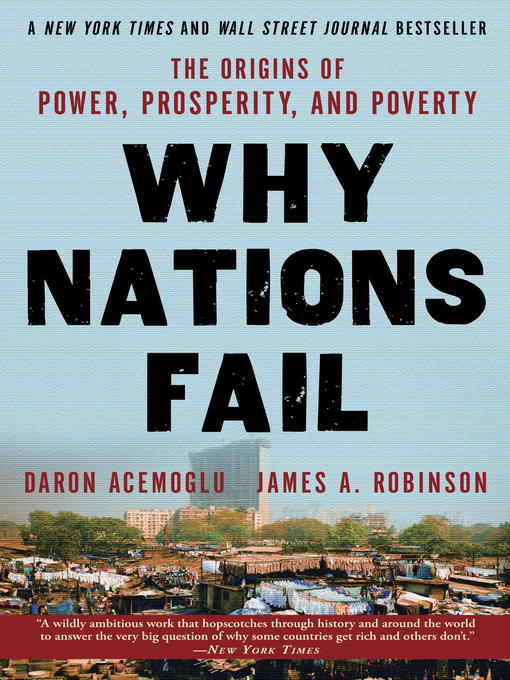
Why Nations Fail
The Origins of Power, Prosperity, and Poverty
فرمت کتاب
ebook
تاریخ انتشار
2012
Lexile Score
1300
Reading Level
10-12
نویسنده
James A. Robinsonناشر
Crownشابک
9780307719232
کتاب های مرتبط
- اطلاعات
- نقد و بررسی
- دیدگاه کاربران
نقد و بررسی

February 1, 2012
Following up on their earlier collaboration (Economic Origins of Dictatorship and Democracy, 2005), two scholars examine why some nations thrive and others don't. Neither geography, nor culture, nor mistaken policies explain the vast differences in prosperity among nations. The reasons for world inequality, write Acemoglu (Economics/MIT) and Robinson (Government/Harvard Univ.), are rooted in politics, in whether nations have developed inclusive political institutions and a sufficiently centralized state to lay the groundwork for economic institutions critical for growth. In turn, these economic institutions give citizens liberty to pursue work that suits their talents, a fairly enforced set of rules and incentives to pursue education and technological innovation. When these conditions are not met, write the authors, when the political and economic institutions are "extractive," failure surely follows. It matters not if the Tsars or the Bolsheviks governed Russia, if the Qing dynasty or Mao ruled China, if Ferdinand and Isabella or General Franco reigned in Spain--all absolutism is the same, erecting historically predictable barriers to prosperity. The critical distinction between, say, North and South Korea, lies in the vastly different institutional legacies on either side, one open and responsive to the needs and aspirations of society, the other closed with power narrowly distributed for the benefit of a few. In their wide-ranging discussion, Acemoglu and Robinson address big-picture concepts like "critical junctures" in history--the Black Death, the discovery of the Americas, the Glorious Revolution--which disrupt the existing political and economic balance and can abruptly change the trajectory of nations for better or worse. They also offer a series of small but telling stories in support of their thesis: how the wealth of Bill Gates differs from the riches of Carlos Slim, why Queen Elizabeth I rejected a patent for a knitting machine, how the inmates took over the asylum in colonies like Jamestown and New South Wales and why the Ottoman Empire suppressed the printing press. For economics and political-science students, surely, but also for the general reader who will appreciate how gracefully the authors wear their erudition.
COPYRIGHT(2012) Kirkus Reviews, ALL RIGHTS RESERVED.

November 15, 2011
No, it's not geography or technology or the clash of civilizations that determine a nation's success or failure, it's that nation's particular institutions--the economic, political, and social rules that both shape and bind societies. So argue Acemoglu, Killian Professor of Economics at MIT, and Robinson, Florence Professor of Government at Harvard. Provocative stuff, backed by lots of brain power, and I like the broad-ranging approach.
Copyright 2011 Library Journal, LLC Used with permission.

March 1, 2012
Advancing a theory about why poor countries are poor, Acemoglu and Robinson, academics at MIT and Harvard, respectively, expound economic historyan activity that repeatedly if surprisingly produces popular books, such as those by Jared Diamond, Niall Ferguson, Steve Levitt, and Charles Mann. Perhaps the reason for high interest in the dismal science lies in a desire for concise, credible explanations about the formidable complexities of economics. If so, Acemoglu and Robinson deliver. They hold that countries become impoverished by despotic government. Opponents of globalization, corporations, and finance find no support in their argument, which recounts economic events from the Roman Empire to Zimbabwe. For each polity under scrutiny, the authors categorize its political institutions as extractive or inclusive. Using Britain's Glorious Revolution of 1688 as an analytical touchstone, Acemoglu and Robinson maintain throughout that laws and customs that protect property pave the road to prosperity, while the caprices of autocracy put property at risk and ultimately stifle growth. With historical examples to keep the exposition moving, Acemoglu and Robinson should recruit general-interest readers curious about economic development.(Reprinted with permission of Booklist, copyright 2012, American Library Association.)

























دیدگاه کاربران